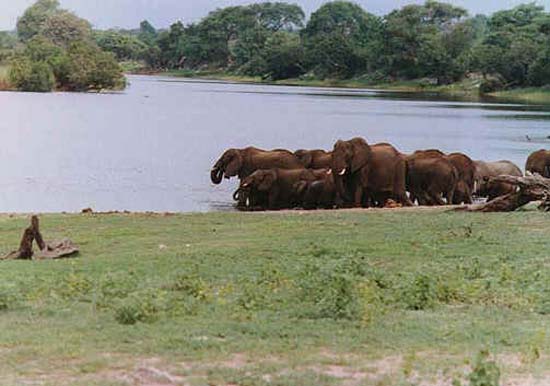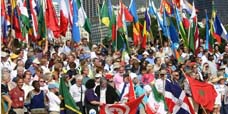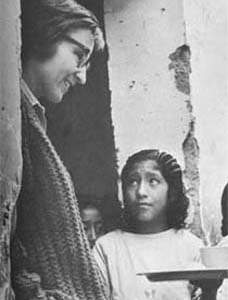February 10, 2005: Headlines: COS - Botswana: Oregon Live: Donna Cohen taught at the Molepolole College of Education in Botswana while a Peace Corps volunteer from 1992 to 1994
Peace Corps Online:
Directory:
Botswana:
Peace Corps Botswana :
The Peace Corps in Botswana:
February 10, 2005: Headlines: COS - Botswana: Oregon Live: Donna Cohen taught at the Molepolole College of Education in Botswana while a Peace Corps volunteer from 1992 to 1994
Donna Cohen taught at the Molepolole College of Education in Botswana while a Peace Corps volunteer from 1992 to 1994

Donna Cohen taught at the Molepolole College of Education in Botswana while a Peace Corps volunteer from 1992 to 1994
Scenes set for popular Botswana tales
Peace Corps volunteer Donna Cohen will share her experiences of the "No. 1 Ladies Detective" locale
Thursday, February 10, 2005
JANET GOETZE
While living in Botswana, Donna Cohen experienced an unhurried life among the dignified, unpretentious people portrayed by writer Alexander McCall Smith in his "No. 1 Ladies Detective Agency" series.
She knew many of the places Smith mentions, including Molepolole, the birth place of Mr. J.L.B. Matekoni, fiance of the books' main character, Mma Ramotswe.
Cohen taught at the Molepolole College of Education while a Peace Corps volunteer from 1992 to1994. She also traveled around the country, taking pictures of places that readers of Smith's series will recognize by name or description.
A former teacher and librarian who now is an information management consultant in Portland, Cohen will discuss in two library programs her experiences in Botswana, show slides of the countryside and play tapes of music.
She will be at the Lake Oswego Public Library, 706 Fourth St., at 7 p.m. Feb. 15. And she will be at Multnomah County's Central Branch Library, 801 S.W. 10th Ave., Portland, at 2 p.m. Feb. 20.
For a short period in Botswana, Cohen said, she lived with a family in a village to gain an understanding of a society operating at a slower pace than she had experienced while growing up in Massachusetts and teaching in Oregon.
"Everyone sat on the porch at dusk, talking about inconsequential things, watching the beautiful sunset," Cohen said. "It was quiet and peaceful as we sat there, eating our porridge."
Her description is reminiscent of a morning in one of Smith's books, when he wrote that Mr. J.L.B. Matekoni waited an hour before calling Mma Ramotswe to give her time to get up and make her morning cup of bush tea.
"Once she had done that, he knew that she liked to sit outside for half an hour or so and watch the birds on her patch of grass," Smith wrote.
Although Molepolole had about 40,000 residents a dozen years ago, Cohen said, most Americans wouldn't consider it a traditional city. For one thing, she said, most of the residents didn't have running water.
She defined Botswana's two cities as Francistown and Gaborone, the capital, because both have running water in most homes.
Cohen said that Botswana, with a population of about 1.56 million, is economically stronger than most emerging African nations.
Botswana became a protectorate of Britain in the 1870s to avoid annexation to South Africa by the Boers. It achieved independence in 1966. A few years later, three of the world's richest diamond mines were discovered in its territory. That didn't raise most individual incomes, according to the Lonely Planet World Guide, but mineral wealth has given the country large foreign currency reserves.
Smith, a professor of medical law at the University of Edinburgh in Scotland, was born in Southern Rhodesia, now Zimbabwe, northeast of Botswana. He went to the University of Botswana to set up a law school and became enchanted with the people.
In an interview for Random House, his publisher, Smith called Botswana "a very special country.
"I think that it particularly chimes with many of the values which Americans feel strongly about -- respect for the rule of law and for individual freedom," he said. "I hope that readers will also see in these portrayals of Botswana some of the great traditional virtues in Africa -- in particular, courtesy and a striking natural dignity."
Cohen said, "I think people enjoy hearing about a society where these values are in place. . . . These books are a love letter to Botswana by the author."
When this story was posted in February 2005, this was on the front page of PCOL:
 | The Peace Corps Library
Peace Corps Online is proud to announce that the Peace Corps Library is now available online. With over 27,000 index entries in 430 categories, this is the largest collection of Peace Corps related stories in the world. From Acting to Zucchini, you can use the Main Index to find hundreds of stories about what RPCVs with your same interests or from your Country of Service are doing today. |
 | Bush's FY06 Budget for the Peace Corps
The White House is proposing $345 Million for the Peace Corps for FY06 - a $27.7 Million (8.7%) increase that would allow at least two new posts and maintain the existing number of volunteers at approximately 7,700. Bush's 2002 proposal to double the Peace Corps to 14,000 volunteers appears to have been forgotten. The proposed budget still needs to be approved by Congress. |
 | RPCVs mobilize support for Countries of Service
RPCV Groups mobilize to support their Countries of Service. Over 200 RPCVS have already applied to the Crisis Corps to provide Tsunami Recovery aid, RPCVs have written a letter urging President Bush and Congress to aid Democracy in Ukraine, and RPCVs are writing NBC about a recent episode of the "West Wing" and asking them to get their facts right about Turkey. |
 | Ask Not
As our country prepares for the inauguration of a President, we remember one of the greatest speeches of the 20th century and how his words inspired us. "And so, my fellow Americans: ask not what your country can do for you--ask what you can do for your country. My fellow citizens of the world: ask not what America will do for you, but what together we can do for the freedom of man." |
 | Latest: RPCVs and Peace Corps provide aid
Peace Corps made an appeal last week to all Thailand RPCV's to consider serving again through the Crisis Corps and more than 30 RPCVs have responded so far. RPCVs: Read what an RPCV-led NGO is doing about the crisis an how one RPCV is headed for Sri Lanka to help a nation he grew to love. Question: Is Crisis Corps going to send RPCVs to India, Indonesia and nine other countries that need help? |
 | The World's Broken Promise to our Children
Former Director Carol Bellamy, now head of Unicef, says that the appalling conditions endured today by half the world's children speak to a broken promise. Too many governments are doing worse than neglecting children -- they are making deliberate, informed choices that hurt children. Read her op-ed and Unicef's report on the State of the World's Children 2005. |
Read the stories and leave your comments.

Some postings on Peace Corps Online are provided to the individual members of this group without permission of the copyright owner for the non-profit purposes of criticism, comment, education, scholarship, and research under the "Fair Use" provisions of U.S. Government copyright laws and they may not be distributed further without permission of the copyright owner. Peace Corps Online does not vouch for the accuracy of the content of the postings, which is the sole responsibility of the copyright holder.
Story Source: Oregon Live
This story has been posted in the following forums: : Headlines; COS - Botswana
PCOL17143
81
.











